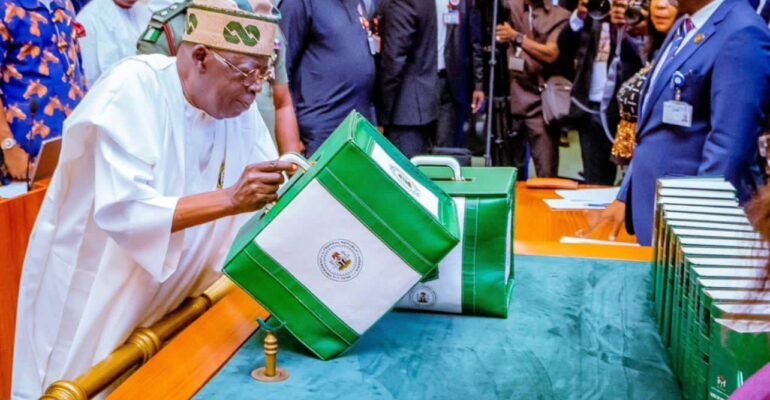2024 Budget Falls Short on Social Welfare, Fails the Vulnerable Majority; HURIWA Decries
Oru Leonard
The Human Rights Writers Association of Nigeria (HURIWA), has expressed profound disappointment over the recently proposed 2024 budget presented by President Bola Ahmed Tinubu, citing significant shortcomings in addressing the critical needs of the poor, unemployed, and youth demographic. Despite claims of being pro-poor, a comprehensive analysis conducted by HURIWA reveals that the budget falls short on key social welfare aspects, leaving the vulnerable majority in a precarious position.
In a press statement on Monday, the association particularly highlighted the meager allocation of only 12.5% to the social sector, encompassing health and education, which clearly indicates that the Nigerian people’s welfare is not being prioritized.
“This allocation is notably below international standards, including commitments made in the Abuja Declaration of 2010, where African nations pledged to allocate at least 15% of their budgets to the health sector alone. Comparatively, progressive nations such as the United Kingdom consider social welfare a cornerstone of their budgetary framework, allocating significant portions to ensure the well-being of citizens, including provisions for the elderly, the sick, and the unemployed.”
Emphasizing the need for Nigeria to learn from these examples and strive to achieve similar standards in its budgetary allocations, HURIWA faulted the allocation of less than 25 percent to the social sector after the government removed subsidies on gasoline and the floating of the naira, which have seen the country’s misery index move up sporadically.
The association is particularly concerned about the contradiction between President Tinubu’s manifesto promise of a 10% allocation to the health sector and a mere 4.9% allocation. According to the rights group, this discrepancy raises questions about the government’s commitment to the health and well-being of the Nigerian people.
“The fact that debt servicing and refinancing costs are taking 30 percent of the entire budget, and debt servicing is practically 94.8 percent of capital expenditure while education and health, the two most critical sectors and determinants of the GDP growth rate and per capita income of the people, cumulatively got 12.5 percent allocation, was an indication that the present government was not ready for change.”
For the leading pro-democracy group, a good way for the President to show that he is attuned to the plight of the people would have been to ask for structural changes through an amendment of the Public Procurement Act to reduce the incidences of procurement fraud in the public sector and the implementation of the Stephen Oronsaye Report to cut down on the cost of running the government and pave the way for more money to be allocated to the education and health sectors.
While acknowledging the shift towards revenue generation over-borrowing, the statement signed by HURIWA’s National Coordinator, Comrade Emmanuel Onwubiko, urged caution to avoid negatively affecting the already struggling working class. Hence, the association called for a balanced approach to taxation, ensuring that the burden does not unduly affect the populace.
“The disproportionate allocation of 45% of the total spending to debt servicing raises serious concerns about the government’s commitment to economic sustainability and poverty alleviation. We emphasize the need for the government to reevaluate its priorities, ensuring that the budget serves the needs of the majority, especially the youth, unemployed, and poor.”
In light of the prevailing economic challenges and the growing misery index, HURIWA further called on the government to increase allocations to social sectors, review tax policies for fairness, ensure transparency and accountability in fund utilization, and engage stakeholders for inclusive decision-making.
After a careful assessment, HURIWA deemed the 2024 budget a whimper, not a bang, and urged urgent and strategic adjustments to make it truly reflective of a commitment to the well-being and future prosperity of the Nigerian people.
(HURIWA Media)




